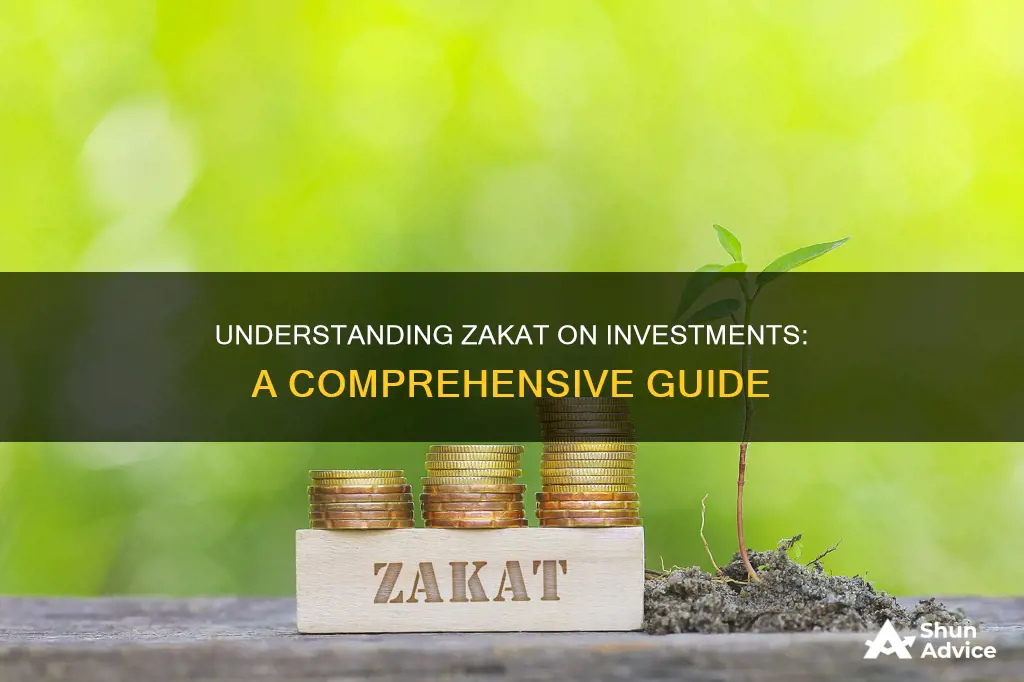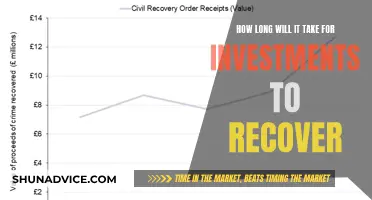
Zakat is the third pillar of Islam and is considered a religious duty for all Muslims. It is a form of charity that purifies one's wealth and induces a feeling of pleasure in giving up wealth. According to scholars, Zakat is payable on stocks, shares, and bonds. If you own stocks, shares, or private equity investments, Zakat is due on these investments. The rate of Zakat applicable is 2.5% of the total value. However, if you plan to resell shares, you should pay 2.5% of their current value. There are different approaches to calculating Zakat on shares, including the market value approach, the zakatable assets approach, and the 25% approach.
| Characteristics | Values |
|---|---|
| What is Zakat? | A form of charity in Islam that purifies one's wealth. |
| Who should pay Zakat? | All Muslims. |
| What does Zakat mean? | "Take", O Messenger, a stipulated amount of alms 'of those seeking to repent,' such as the obligatory zakat, or 'take' a voluntary unstipulated amount. |
| What is Zakat paid on? | Assets that have reached the nisab, the threshold representing the minimum amount of wealth that a Muslim must own before being obliged to pay it. |
| What is the nisab? | The approved nisab on most assets is the value of 87.48 grams of gold kept for a full lunar year. |
| What is the rate of Zakat? | 2.5% annually. |
| What types of assets does Zakat apply to? | Cash, gold, shares, or stocks. |
| Does Zakat apply to investments? | Yes, if they fulfill the conditions for paying Zakat. |
| How is Zakat calculated on investments? | There are several methods, including the market value approach, the zakatable assets approach, and the 25% approach. |
| What is the market value approach? | The total value of the portfolio is treated the same way as cash, and 2.5% of the entire value is paid as Zakat. |
| What is the zakatable assets approach? | The Zakat is calculated based on the percentage of the company's assets that are liquid and easily converted into cash. |
| What is the 25% approach? | A simplification of the zakatable assets approach, where it is assumed that 25% of a company's assets are Zakatable. |
What You'll Learn

Zakat on stocks and shares
Zakat is a fundamental pillar of Islam and is compulsory for all Muslims who reach the Nisab threshold. It is calculated based on accumulated wealth, and this includes stocks and shares.
A share (or stock) represents ownership of a company. The more shares you buy, the more of the company you own, and the more you can potentially earn. Shares give entitlement to a share of the profits and to a say in key business decisions.
There are mixed opinions on whether shares are permissible (halal) or impermissible (haram). Some scholars believe all shares are haram, while others believe they can be halal, depending on the nature of the company. If a company engages in haram practices, such as immoral actions, Riba (charged interest), or indecent content, you must not buy or sell its shares. If the company does not engage in such practices, it may be considered halal to purchase its shares.
There are three commonly used methods to calculate the value of Zakat on stocks and shares:
- The market value approach: If you are buying shares with the intention of a short-term profit, you should use this method. Treat the total value of your portfolio the same way you would treat cash, and pay 2.5% of the entire value as Zakat.
- The Zakatable assets approach: If you are buying shares with the intention of holding them as a long-term investment, you can use this method. Instead of taking the value of your shares as the basis for Zakat, look into the company's liquid assets (e.g. cash, stock, money in a bank account, etc.) and pay Zakat on that value.
- The 25% approach: This is a simpler version of the Zakatable assets approach. Here, you assume that 25% of the company's assets are Zakatable and pay 2.5% of that value.
If the company whose shares you own pays Zakat on its assets, you do not need to pay Zakat on them as well. It is not permissible for two Zakat payments to be made on the same wealth.
All Muslims must make their obligatory Zakat payment once every lunar year. There is no set date, but many choose to donate during the last 10 days of Ramadan.
Who can receive Zakat?
There are strict guidelines on who can receive Zakat, as outlined in the Qur'an: "Zakah expenditures are only for the poor and for the needy and for those employed for it and for bringing hearts together [for Islam] and for freeing captives [or slaves] and for those in debt and for the cause of Allah and for the [stranded] traveller – an obligation [imposed] by Allah. And Allah is Knowing and Wise." (9:60, Surah Tawbah)
Alpha Investments: Why the Hate?
You may want to see also

Zakat on rental income
Zakat is payable on rental income, but not on the leased property itself. The rate of Zakat on rental income is 2.5% according to some sources, and 5% or 10% according to others.
Zakat is payable on rental income if it reaches the nisab threshold during the passage of an Islamic lunar year. Nisab is the specified value threshold of Zakat, which is the currency equivalent of 85 grams of pure gold.
If you receive rent in advance and spend it before the end of the year, you do not have to pay Zakat on it. If you receive rent at the end of the year, you must pay 2.5% of the rent as Zakat.
If you are paying Zakat on an annual basis, you should pay it at the completion of a lunar year, calculated from the first date that you receive any rental income.
You can deduct essential personal expenses from your rental income before calculating your Zakat liability.
Sherwin-Williams: Time to Invest?
You may want to see also

Zakat on pensions
Zakat is payable on certain types of pensions, specifically defined contribution schemes, in proportion to the underlying Zakatable assets in the fund. Defined benefit schemes, such as final salary and CARE schemes, are not Zakatable.
For pensions where Zakat is payable, the amount owed is calculated based on the ratio of Zakatable assets in the portfolio. This can be done by reviewing the pension factsheets and company balance sheets to determine the value of Zakatable assets. If this is too difficult, a rule of thumb is to take 25% of the current market value of the portfolio as a proxy for the Zakatable assets and then pay 2.5% of this figure as Zakat.
For example, if a portfolio is worth £10,000, one would take 25% (£2,500) and then 2.5% of this (£62.50) as Zakat. It is preferable to pay Zakat annually, but it is permissible to wait until funds are realised upon retirement and then pay the accumulated Zakat at that point.
It is important to note that Zakat is not due on the entire quoted value of the pension fund. The amount of Zakat payable is determined by the nature of the underlying investments, which are usually stocks and shares. If part of the pension is held in cash, then Zakat is due on all of that portion, minus any interest.
Additionally, there is no Zakat due on National Insurance contributions. If one is receiving payments from a government pension, only the residual cash in possession on the Zakat due date needs to be factored in.
S&P 500: Invest Now or Wait?
You may want to see also

How to calculate the amount of Zakat owed
Zakat is payable at 2.5% of the wealth one possesses above the nisab. Nisab is the minimum amount of wealth one must have before they are eligible to pay zakat. The nisab threshold as of April 2024 was $5,927, based on the value of 85 grams of 24K gold.
To calculate the amount of zakat owed, you must first identify your zakat-eligible assets, such as money, property (if it is investment-property), precious metals, and shares. You then need to calculate the value of these assets. Next, identify your liabilities, such as debt from credit cards and loans, and calculate their value. Then, subtract your liabilities from your assets to determine your zakat net worth.
If your zakat net worth is more than the nisab, and a lunar year has passed since you first reached nisab, you owe zakat. If your zakat net worth is more than the nisab, but a lunar year has not passed, you do not owe zakat. If your zakat net worth is less than the nisab, you don't owe zakat for that year.
Zakat is 2.5% of your zakat net worth. For example, if your zakat net worth is $4,000, then your zakat is $100 ($4,000 x 0.025 = $100).
It is important to note that there are different opinions on how to assess the zakat of stocks, shares, and bonds. Some scholars believe that zakat is owed on profits, such as dividends or interest, at a rate of 2.5% annually, provided that the sum reaches the nisab threshold. Others assess zakat on these holdings according to the type of business activity the capital investment goes towards. According to this view, if the investment goes into buildings, machinery, and infrastructure, zakat is only due on the dividends distributed as profit, not on the investment itself.
Delinquent Utilities: Invest Wisely in Others' Defaults
You may want to see also

The permissibility of investments
Islam makes no division between the spiritual and the secular, and investments are no exception. This means that there is much more scrutiny applied to investment practices because religion is factored into all financial decisions.
Islamic investments are a unique form of socially responsible investment. For an investment to be compliant with Islamic Investment Policy, it must follow a specific set of guidelines. These guidelines are based on Sharia law, which is derived from interpretations of the Quran, the Sunnah, Qiyas, and Ijma.
Some of the key principles of Sharia-compliant investing include:
- Avoid Interest (Riba): Earning money from money, such as charging interest, is considered haram (forbidden). Therefore, conventional fixed-income securities like bonds are generally off-limits.
- Ethical Considerations: Companies involved in unethical or immoral activities such as producing alcohol, gambling, and adult entertainment are unsuitable for halal investment.
- Asset Backing: Investments should be backed by physical assets. Highly speculative investments are generally considered non-compliant.
- Transparency and Fairness: All parties in a trade should understand the contract, the product, and the associated risks, ensuring fairness for everyone involved.
- Avoid Excessive Uncertainty (Gharar): Transactions full of uncertainty or ambiguity are considered haram.
Some specific examples of permissible investments in Islam include:
- Precious metals like gold and, to some extent, silver, are permissible because they have been historically used as currency and hold intrinsic value.
- Sukuk, or Islamic bonds, are structured to comply with Islamic laws prohibiting charging or paying interest. Instead of being debt-based, they are asset-based securities.
- Real estate is also considered a permissible investment, as long as it is not generating income through haram means, such as renting to a liquor store or a gambling facility.
- Mutual funds and exchange-traded funds (ETFs) that pool money from multiple investors to buy a range of assets can be permissible as long as they are carefully screened to ensure compliance with Islamic principles.
- Some Islamic scholars recommend treating cryptocurrencies like commodities, where trading is conducted in a manner that adheres to Islamic principles like immediate transaction settlement and the avoidance of speculation. However, this is a controversial topic, and it is recommended to do your own research.
Invest or Hold Cash: Now What?
You may want to see also
Frequently asked questions
Yes, you do. If you plan to resell shares, you pay 2.5% of their current value. If you are holding them as a long-term investment, you pay 2.5% of your proportionate ownership of the Zakatable assets of the companies in which you have invested.
There are three main methods: the market value approach, the Zakatable assets approach, and the 25% approach. The first is suitable for short-term investments, and the latter two are more suitable for long-term investments.
Yes, you do. Our preferred view is that you pay 2.5% on 40% of your pension pot value if you have a normal workplace pension.
If you rent out your property, you pay Zakat on the net annual income from your property. If you intend to resell the property, you should pay Zakat on the whole value of the property.







